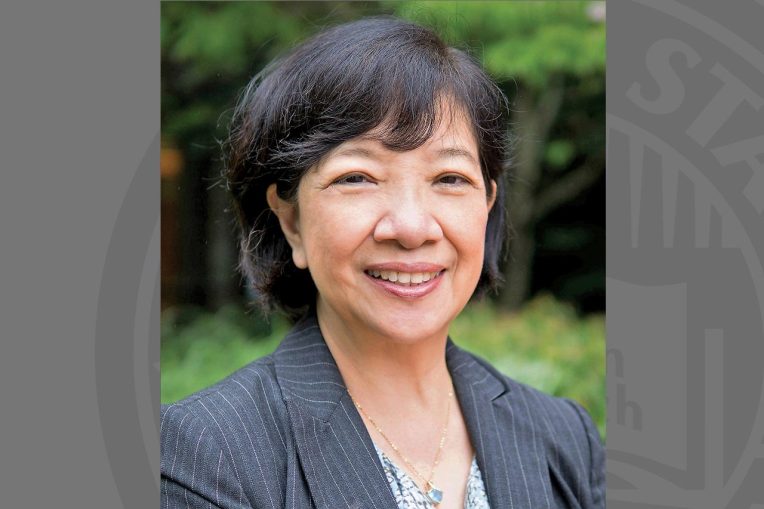Dr. Jenny Ting’s only college application turned out to be a game-changer.
“I only applied to Illinois State University,” said Ting ’75. Her brother and sister-in-law were students at Illinois State, and she attended on a foreign student tuition waiver scholarship. Originally a biology major, Ting also took classes in chemistry, botany, and zoology. She eventually found her passion in medical technology (now known as medical laboratory science).
“To this day, I think the teachers at ISU are the best. They made the subject matter really interesting and easy to digest,” she said.
Ting remembers her time at Illinois State as being a very positive and impactful stage of her life. “Before ISU, I was not a very motivated worker. I never had to exert myself that much,” Ting said. “Being so far away from home, realizing that I was on my own just made something inside click. I knew I had to get this right.
“I worked super-hard in college. I took 21 hours of classes during some of the semesters while working in the dining centers 15 hours a week and tutoring others six hours a week. Suddenly, I had these challenges, and that woke me up. It trained me to multitask and not complain. I had a really good time, despite that schedule. I really enjoyed the school environment.”
After graduating with her bachelor’s degree, Ting went immediately to graduate school. She earned a Ph.D. from Northwestern University and completed postdoctoral work at the University of Southern California and Duke University. She is the William R. Kenan Professor of Genetics and a professor of microbiology and immunology; the Immunology program co-leader at the Lineberger Comprehensive Cancer Center; and the director of the Center for Translational Immunology, all located at the University of North Carolina at Chapel Hill. Ting is currently an elected member of the prestigious National Academy of Sciences and the American Academy of Arts and Sciences.
Ting’s research focus is on immunology, the study of the immune defense of the body. She studies a wide variety of fields within immunology, including autoimmunity, inflammation, the microbiome, vaccine responses, and cancer.
Her studies of cancer examine the immune aspects of fighting cancer, including pancreatic, colon, lung, breast, and melanoma cancers. Ting and her team study the inflammation response in cancer. “The basic question is, How can we manipulate good inflammation to fight against cancer and reduce the bad inflammation? The inflammation response in cancer is critical.”
Ting’s study of the microbiome examines how to promote beneficial bacteria to prevent diseases, including colitis, colon cancer, and response to radiation.
In addition to research, mentoring has been a large part of Ting’s career. She has mentored over 100 pre- and post-doctoral researchers.
“When it comes to choosing something that can benefit the mentee, versus something that can benefit you, pick the mentee,” Ting said. “It was a hard choice in the beginning, but I want the experience in my lab to launch their careers. You also have to remember that the time trainees spend in the lab is transient; you have to encourage them to move on, which is hard because that is usually the time when trainees are really well trained and productive, but you have to do what is best for them.”
When it comes to selecting people to join her team in the lab, Ting seeks individuals who are dedicated and hard-working. “I look for someone who can be creative, connect the dots, and think beyond,” Ting said.
Personality is just as important, Ting said. “I look for team players; people who are willing to help others. It is also helpful if someone has an optimistic attitude; someone that doesn’t get beaten down is such a valuable addition to the team. I try to detect toxic personalities and avoid them. I have gotten better about detecting that as I’ve gotten more experienced.”
Ting runs her lab a bit unconventionally, allowing multiple projects to move forward at the same time. Most people in her lab work on two or three projects at a time. “I want people to be successful, and having multiple projects at the same time helps to achieve that.”
Currently, Ting’s team is exploring a large family of proteins involved in the control of inflammation. “Lots of other labs are studying these proteins as well. Some of the family members are a mystery,” she said. “We don’t know how they function. We know they are involved in inflammation, but we don’t know the details. We are also looking at how they are involved in non-immune systems, such as neurodegenerative diseases.”
Ting visited Illinois State last February when she received the Distinguished Alumni Award. Although the awards ceremony was canceled due to weather, she was still able to enjoy campus. “When I was a student, I didn’t have time to enjoy it and really soak it in.”

